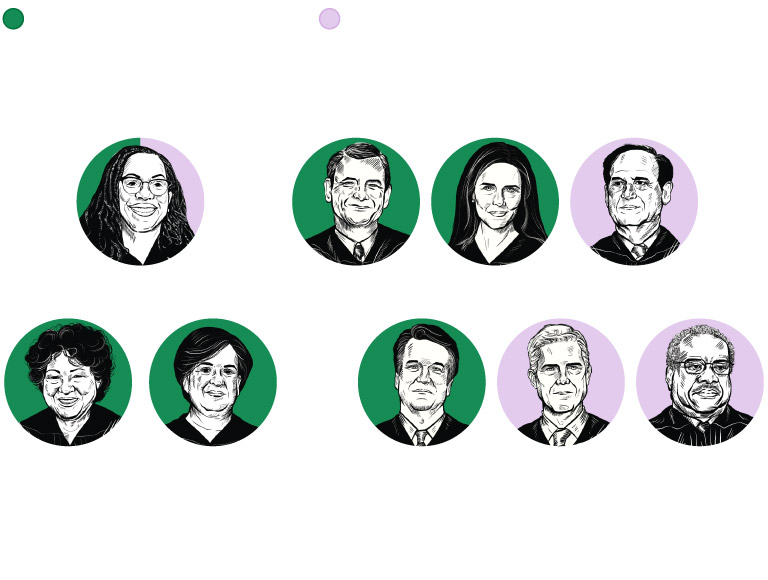Three conservatives — Justices Clarence Thomas, Samuel A. Alito Jr. and Neil M. Gorsuch — dissented.

Note: The majority opinion was unsigned. Jackson
concurred with the majority and also filed a partial dissent.

Note: The majority opinion was unsigned. Jackson concurred with the
majority and also filed a partial dissent.

Note: The majority opinion was unsigned. Jackson concurred with the majority and also filed a
partial dissent.

Note: The majority opinion was unsigned. Jackson concurred with the majority and also filed a partial dissent.
At issue is the nearly four-decade-old Emergency Medical Treatment and Labor Act, known as EMTALA, which requires certain hospitals to stabilize or transfer patients needing emergency care.
The Biden administration sued Idaho in 2022, saying the state’s strict abortion ban conflicts with the federal law, which the Justice Department says mandates emergency abortions if needed to address threatening health conditions short of death, such as organ failure or loss of fertility.
Abortion rights groups and medical experts cast the ruling as a temporary victory that ensures emergency care in Idaho for now but does not settle the question of whether federal law preempts strict state bans, including in other states.
“We don’t have time to wait for this to grind its way through the court process,” Susie Keller, the CEO of Idaho Medical Association, said in an interview Thursday. Keller said that obstetrician/gynecologists are “fleeing” Idaho in the wake of its abortion ban. Citing data that shows about one in five OB/GYNs have left the state, she called on the Idaho legislature to change the law to explicitly allow abortions when a pregnant woman’s health is threatened, even if her life is not in danger.
Idaho Attorney General Raúl R. Labrador (R) also claimed a partial victory, noting that some conservative justices embraced his state’s arguments that EMTALA did not trump the state ban in these circumstances. He also pointed out that Justice Amy Coney Barrett, who joined the majority, wrote in a concurring opinion that the Biden administration had offered concessions that limited the potential sweep of the federal law.
“We feel pretty strongly that we’re going to win this case in the end,” Labrador said on a call with reporters. “My office won significant concessions from the United States that Justice Barrett described as ‘important’ and ‘critical.’”
The Idaho case was one of two before the high court this term to address abortion access nationwide two years after the justices overturned Roe v. Wade, which had guaranteed a constitutional right to abortion. The justices in early June unanimously rejected a challenge to the widely used abortion medication mifepristone, saying the antiabortion doctors who brought the lawsuit did not have standing to do so.
The Supreme Court agreed to intervene in the Idaho case in January, in response to the state’s emergency request, but allowed the abortion ban to take effect while it heard arguments in the case and deliberated.
The Biden administration first turned to EMTALA in late 2021 as a way to try to ensure access to abortion in limited situations. That effort ramped up after the Supreme Court struck down Roe the following summer.
In July 2022, the administration told hospitals receiving Medicare funds that emergency room doctors must terminate pregnancies in some circumstances, even if a state’s law bars the procedure. Hospitals that do not comply face penalties of up to $120,000 per violation.
The White House and abortion rights advocates say the administration is applying the emergency-care law as originally designed, pointing to years-old cases they say show a consistent pattern of enforcement.
Idaho bans all abortions except those necessary “to prevent the death of the pregnant woman” and imposes penalties of up to five years on doctors who perform the procedure. There have been harrowing reports of hospitals turning away women with high-risk pregnancy complications. Health-care workers have reported uncertainty and confusion about when state abortion bans apply, resulting in delays for some procedures.
Conservatives and abortion opponents say the administration is twisting EMTALA’s intent to secure abortion access post-Roe.
The text of the federal statute requires hospitals to offer “any individual” with an emergency medical condition “such treatment as may be required to stabilize the medical condition.” There is no reference to abortion in the statute or to any other type of care, and GOP officials say the Biden administration cannot use EMTALA to force hospitals that receive federal funds to violate a state law.
Lower courts had issued conflicting decisions about the application of the federal law. A district judge in August 2022 sided with the Biden administration and temporarily blocked the contested provision of the Idaho law. The judge left the state’s ban on most abortions in place but said that because of the obligation of hospitals under conflicting federal law, a doctor cannot be punished for performing an abortion to protect a patient’s health.
Then a three-judge panel of the U.S. Court of Appeals for the 9th Circuit allowed the state to enforce the law — before a full complement of judges on the same appeals court again blocked Idaho’s ability to punish emergency room doctors while the appeals continued.
Thursday’s abortion ruling — coming hours before President Biden and presumptive Republican challenger Donald Trump are set to meet in a prime-time presidential debate — underscores the stakes of this November’s election, advocates have said. While Biden has worked to protect abortion access, Trump imposed new restrictions on abortion funding during his four years as president and vowed to nominate justices who would overturn Roe v. Wade. Trump picked three of the five justices who voted to end the national right to abortion.
“The Biden-Harris Administration is committed to protecting access to emergency medical care for everyone in America and ensuring that women get the care they need,” Health and Human Services Secretary Xavier Becerra said in a statement.
Democrats on Thursday also suggested that the high court was attempting to sidestep the political pressure around abortion this year.
“The Supreme Court decided to wait until after the election to tell Americans whether women who are in crisis can get the emergency medical care they need,” Sen. Elizabeth Warren (D-Mass.) said in a statement. “The Supreme Court doesn’t get the final word on abortion — the American people do.”
This is a developing story. It will be updated.

